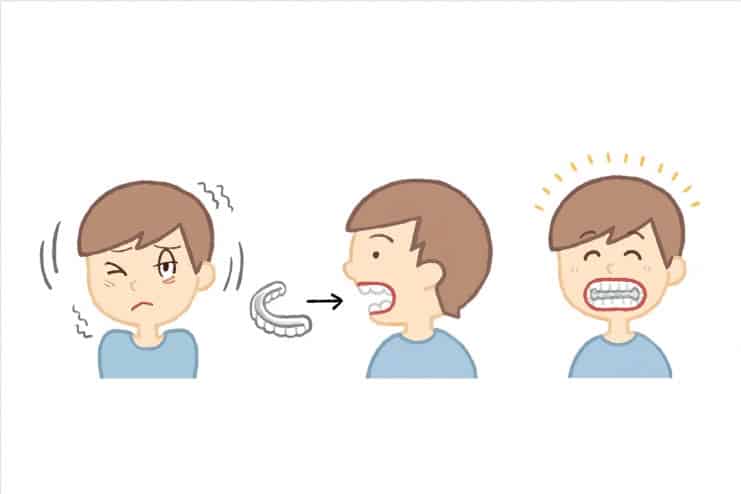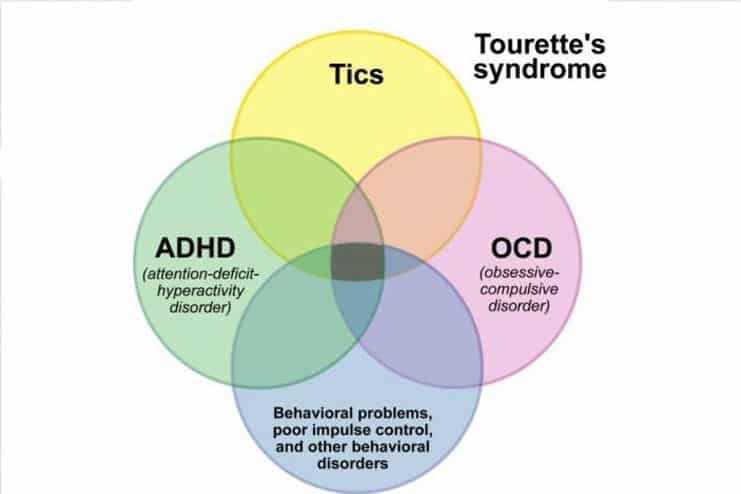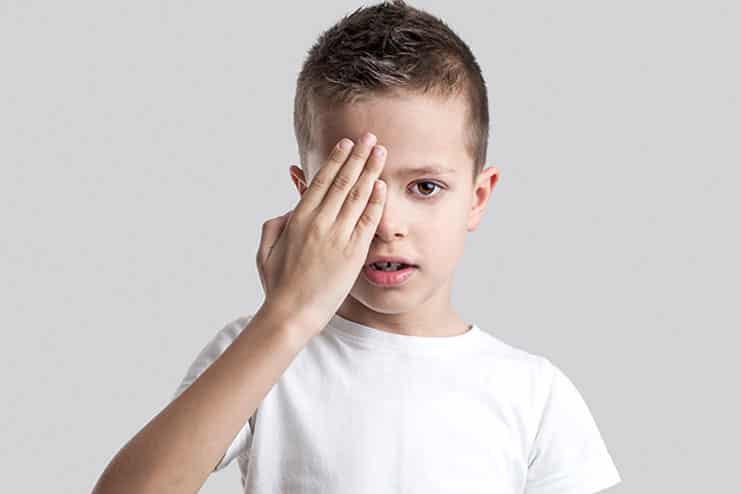Babies undergo various changes behaviorally, mentally and physically right from the birth. Each and every change is so special for the new parents. There are certain behaviors that are to be paid immediate attention. Tourette syndrome is the abnormal behavior of your child that you should know. A complete understanding of any disorder will help you to intervene and fix at the right stage.
It is a rare condition that can affect the children of both the genders. Records from 2011-12 showed that approximately 1 out of 360 children between the age of 6 and 17 years are diagnosed with Tourette syndrome. Scroll down to find out more about the Tourette syndrome, symptoms, treatment, and parenting tips.
What Is Tourette Syndrome In Child?

Tourette syndrome is the movement disorder that appears in the childhood. It causes the kids to make the jerky movements or sounds that they do not have the control over. These are known as the tics. These tics usually get milder with the age of the children and goes away in their adulthood.
Tourette syndrome usually appears in the childhood between the ages of 5 and 9 years old. Boys are at the greater risk of this syndrome than girls.
Difference Between ADHD and Tourette:

ADHD and the Tourette are the two different conditions and have the few conditions in common. They may start at the same age and sometimes both the conditions occur at the same time.
There are some key characteristics that can help you to distinguish the condition and provide the right diagnosis for your child.
The way they are alike:
Kids with the Tourette make both the oral and the motor tics ranging from the simple to complex that include constant eye blinking, sniffing, grunting, to shoulder shrugging, facial expressions, head movements or making the repeated words. The tics may happen several times in a day. Kids with the ADHD may have the symptoms that are similar to the tics. They might be the fidgets, or making the random noises. Kids who take up the ADHD medicine called the stimulants may show up the tics. The drugs may make the behaviors more noticeable and they can disappear on their own without any treatment.
Symptoms of the ADHD appear at the early stages between 3 to 6 years and they are diagnosed when the kids are at the elementary school. On the other hand, the symptoms of the Tourette start to appear at the age of 7.
Most of the cases, children have both ADHD and Tourette. More than 60% of the children with Tourette are likely to have the ADHD.
Researchers have found that there is genetic condition associated with the Tourette syndrome and the behaviors like ADHD, and OCD.
How they are different:
Kids with the Tourette almost make the same movements all the time whereas the behaviors that ADHD kid display may vary and are mostly like trouble with the attention.
The symptoms of the Tourette may get severe in the late teen years and can go away on their own, ADHD symptoms cannot go without any treatment and may prevail all throughout the adulthood.
Symptoms Of The Tourette Syndrome (Tics):

Tics are the signs of Tourette syndrome.
Tics can be of both movements and related to sounds. The intensity and the frequency of the tics vary with the person. These tics go more severe under the stress, can occur during the sleep, and may change over time. The tics sometimes may go severe before the mid teen years. A great development develops in the late teen years which may continue till the early adulthood.
Let us look into the types of Tics that are associated with the Tourette syndrome:
1. Motor Tics:
Again there fall two categories in the motor tics: simple motor tics and complex motor tics
Simple motor tics are associated with single muscle and the complex motor tics look like the person is doing something on purpose. Complex motor tics are usually associated with the muscle groups.
Simple motor tics include:
• Nose wrinkling
• Head twitching
• Eye blinking
• Lip biting
• Facial grimacing
• Shoulder shrugging
Complex motor tics include:
• Kicking
• Jumping
• Mimicking the movements that are done by others
• Smelling the objects
2) Vocal Tics:
There are simple and complex vocal tics. Simple vocal tics involve one simple sound and complex vocal tics produce more meaningful speech like words.
Simple vocal tics include:
• Coughing
• Throat clearing
• Grunting
• Sniffing
• Barking
• hissing
Complex vocal tics include:
• Calling out
• Yelling
• Repeating words and phrases
• Animal sounds
Causes Of Tourette Syndrome:
Causes of the Tourette syndrome are not well known. It is a complex disorder that is stemmed from the combination of the generic and the environmental factors.
Tourette syndrome is associated with the various parts of the brain, including an area called the basil ganglia that is responsible for controlling the body movements. These differences may affect the nerve cells and the chemicals that carry that carry the messages between them. Misfunctioning of the brain network may give the way for the Tourette syndrome.
Kids who have the family member with this condition are likely to get condition.
Diagnosis For The Tourette Syndrome:
Diagnosis of the Tourette is based on the signs and the previous health history of the kids. Details of the behavioral history from the parents and teachers play a prominent role in the diagnosis of the treatment in addition to the observational behavior made by the doctor. Early intervention, diagnosis, and the treatment is required for the healthy and the productive lives.
To be diagnosed with the Tourette a person should meet the following:
• Displaying both motor and the vocal tics, either at the same time or at some times in a day
• Making the tics for at least about 1 year
• The tics began even before the age 18.
Further diagnosis is made by the neurologist. The recommended tests for the Tourette are:
• Blood tests
• Imaging studies such as an MRI
Treatment For Tourette Syndrome:
Your doctor may advise you to visit a neurologist, if your child has the symptoms of Tourette.
1. Medication:
It is difficult to diagnose disease as it does not cause any impairment. Any kind of medication is not required for the people with the Tourette syndrome. Medication is available for those who have symptoms that interfere with the normal body functioning. Neuroleptics are the effective medicine to deal with the tic suppression. These drugs are one of the best Tourette syndrome treatments. These drugs are well known to treat the psychotic and the non-psychotic disorders. There is no medication that can help to get the complete relief from the Tourette Syndrome. All the medications may have the side effects to some extent. The effects of the neuroleptics can be curbed by initiating the treatment and by slowly reducing the symptoms whenever the side effects occur.
Cognitive dullness, sedation, and weight gain are the more common side effects of the neuroleptics. This medication may also result in some neurological side effects including tremor, dystonic reactions, parkinsonian-like symptoms, and other dyskinetic movements. These are very rare and can be managed with the dose reduction.
Discontinuation of the neuroleptics should be done slowly to avoid the increase in the symptoms of the Tourette syndrome and withdrawal dyskinesias. These side effects can be mitigated by lowering the dosage for the short term.
There are other medication but they need the extensive study to prove that they work as effectively as neuroleptics. Certain mediaction proved the efficacy while dealing with the Tourette syndrome including alpha-adrenergic agonists like clonidine and guanfacine. These medicines are used in the treatment of hypertension and they are also used to treat the Tourette syndrome. Due to the lowest risk of the side effects these are usually given to the patients before giving the neuroleptics.
There are some specific medicines available to deal with the certain behavioral changes in the patients with Tourette syndrome.
Stimulant medications like methylphenidate and dextroamphetamine care well known to reduce the symptoms of the ADHD in kids with Tourette syndrome.
2. Behavioral Therapy:
Behavioral treatments such as awareness training and competitive response training can help to lower the symptoms of Tourette syndrome.
Two types of the behavioral therapies are known to have the effective impact on the Tourette:
A. Habit reversal training:
The main theme of this therapy is to work with the triggers of the tics. The next stage is to find out the alternative way to that help to get rid of the urge for the tics.
B. Exposure with response prevention:
This method helps to get better control over the urge to use the tics. Techniques are used to make you implement the behaviors to tolerate the tics until the urge for the tics goes away.
Supportive therapy can help the person with the Tourette syndrome to deal with the emotional and social problems that may occur sometimes.
3. Psychotherapy:
In addition to dealing with the symptoms of the Tourette, psychotherapy can help you cope with the underlying conditions such as ADHD, obsession, depression or anxiety.
4. Deep brain stimulation:
The severe kind of the tics that are often irresponsive to the other kind of the treatments are treated this way. A battery operated medical device is implanted in the brain to send the electrical stimulations to the target areas to control the movements.
This technique needs further research and the investigation to ensure the safety.
Living With The Tourette Syndrome:
Tourette syndrome can affect the personal life from all the dimensions including health, education, employment, and the relationships. It can have its effects on the physical, mental, and the emotional well-being.
The Tourette syndrome is accompanied by the many other behavioral problems in the child. The following are a few:
• Attention deficit hyperactivity disorder (ADHD)
• Obsessive-compulsive disorder, under this condition the thoughts may occur repeatedly.
• Depression and anxiety
• Other behavioral or conduct problems
What To Do While Visiting The Doctor?
Your time with the doctor is very limited. So, making note of everything in advance can help you to make the best use of time. Here are a few things that you should keep in mind before visiting the doctor:
Be aware of the pre appointment restrictions: while you are making the appointment be sure to ask that is there anything that you can do in advance, such as the restriction in the diet.
Write down the symptoms that the child is experiencing: note down any unrelated symptoms that are not related to the reason for which the appointment is taken.
Note down the key personal information: including any major stresses and the recent changes of the life
Make a list of the medication: a list of medication that you currently use for your child that may be for the present condition or any other reason.
Make a video recording: a video recording can help the doctor to analyze the situation well.
Write down the questions to ask: write down any questions that you wish to ask your doctor.
Don’t hesitate to ask your doctor anything during the consultation. Here are some basic questions to ask your doctor:
• What kind of treatment, if any needed?
• In case the medication is recommended, what are the options?
• What type of the behavioral therapy might help to deal with the situation?
Parenting a Child With Tourette Syndrome:

Hope get a clear idea on what the Tourette is exactly. Support and guidance of the parents play an important role while coping with the symptoms of Tourette in the social setting:
1. Get your child engaged and busy:
Busy minds may reduce the intensity and the frequency of the tics. Keep your child engaged with some creative and interesting games. Allow your child to do crafts and play board games. Encourage them to play outdoors. This can help your kid to stay healthy and active. Ask them to do yoga or meditation in the early morning to get the control over their movements. This is one of the best ways to get rid of Tourette syndrome.
2. Enlighten their charity:
Dealing with the Tourette syndrome cannot stop them from thinking about the others. Make your child to participate in the voluntary activities that can help lift their self-confidence and the empathy towards the others.
3. Embrace the creativity:
Get your child some creative and enjoyable activity. Help your child to embrace the creativity hidden in them. Creativity is a great way for the kids to express their views and opinions. This can further help them to keep their minds busy so that they are less prone to the tics.
4. Model the personalized approach:
No two kids may behave alike so the techniques that you choose to rectify their behavior should be based on their attitude and behavior. The thumb rule to pick out the plan that can work well with your child is to use the combination of the child’s evaluation along with their knowledge. You may not make out a plan perfect for them in a single attempt. Working on the fallbacks may help you adopt the best strategy.
5. Encourage your child to participate in the social events:
Encourage your child to participate in the extracurricular activities where they can utilize their physical strength to their best. Kids can get a chance to minimize the intensity of their tics when they are more focused with their movements in any outdoor play. Kids get a space where they can make the new friends and work on the social skills.
6. Let your child’s teacher know their tics:
It is more important to explain to your kid’s teacher about their problem. This can help your child to feel assured all the time. Your child can go away from the classroom to do their tics without disturbing others with the support of their teacher. Develop good relationship with your child’s teacher to stay updated with kid’s behavior.
7. Discipline your child:
It is not possible for your child to stop their tics with any kind of punishments because, the tics are like the sneezes and they can’t be controlled. Some kids can delay the tics for a short period of time but it is hard to stop them.
8. Never let your child’s confidence go down:
Never allow your child to get depressed with their tics. Offer a supporting hand for them and assure that you are there to get them out of any typical situations. Let your child adopt the positive behavior and help them with the techniques like yoga, medication to lift their confidence, focus, and attention.
Supportive Home Remedies For The Tourette Syndrome:
You do not need any medical equipment to carry out the therapy. A few ingredients available at the home can be used to mitigate the symptoms of the Tourette. Let us see how it can be done.
1. Magnesium:
kids who suffer from the magnesium deficiency are likely to show the symptoms of the Tourette. Give your child a magnesium citrate pill after consulting the doctor. 250-500 mg of the magnesium can work effectively to alleviate the symptoms. Check with your doctor for the dosage levels as the over dosage may bring in many side effects including runny bowel movements or stomach upset.
2. Epsom Salt bath:
The best way to infuse the magnesium in your child’s body is through the Epsom salt. Add a few cups of EPSOM salt to his night bath and make your child to put their legs in the warm cup of the EPSOM salt for about 20 minutes. This can help the body to absorb the magnesium and it is also a great way to calm down the mind and have the sound sleep at the night. The thumb rule to get rid of the twitchy body is the sound sleep.
3. N-Acetyl Cysteine:
NAC helps to keep up the levels of the glutathione in one’s brain and this serves as the antioxidant. This yields the greater results in the kids who suffer from the OCD and can give the promising results for the Tourette.
Protein rich foods such as Chicken, turkey, yogurt, cheese, eggs, sunflower seeds are the great way to increase the cysteine intake.
4. Eliminate the dyes:
Food dyes are harmful and may excite the brain leading to the wide range of conditions from the ADHD to the tics. Avoid the foods with artificial colors.
5. Avoid caffeine, sugar and soda:
Consumption of the caffeine, sugar, and soda may affect the dopamine levels in the brain. it is recommended for the patients getting treatment for the patients to avoid Tourette syndrome. A special eating plan will not help to eliminate the tics but it may have the overall positive effect on reducing the severity of the condition. avoid those foods that are allergic to your child.
6. Lifestyle changes:
Last but the most effective way that can help the treatment work well. Mild cases of the Tourette symptoms can be treated with the relaxation exercises that can reduce the stress. Some of the relaxations techniques include the deep breathing, visual imagery, and the guided muscle relaxation. Simple life style changes can help the kids to achieve the control over the tics. Stress is the biggest barrier to alleviate the tics. Help your child to adopt the mindful daily routines.
Tics may rise to the peaks when your child enters the teenage. Proper support, guidance, and continuous treatment strategies can help them to overcome the unwanted behavior and achieve the continued success.
FAQ’s:
Is Tourette syndrome a mental illness?
It is a neurological illness that results in the uncontrolled, rapid, and purposeless movements.
Is Tourette syndrome curable?
There is no cure for the Tourette syndrome. Treatments may help to alleviate the intensity of the tics. If the tics are not severe, no treatment is required.







































